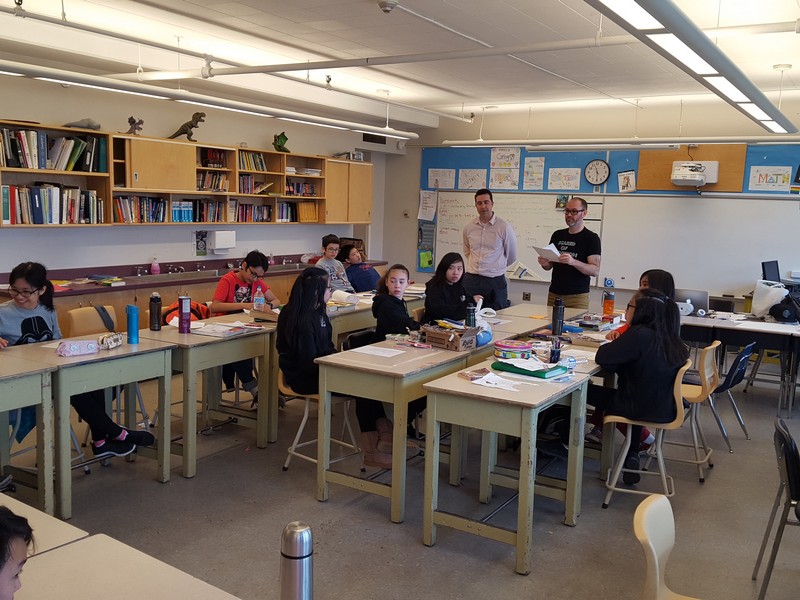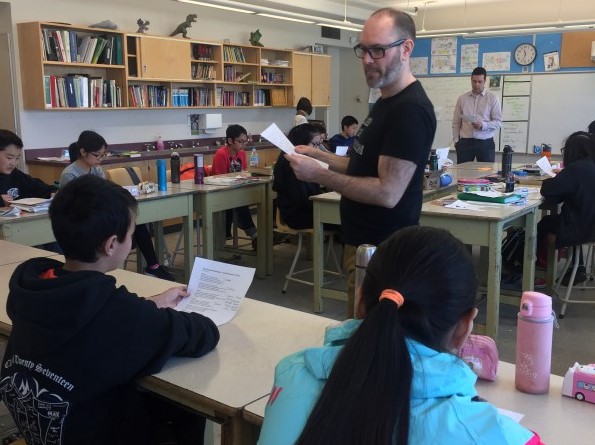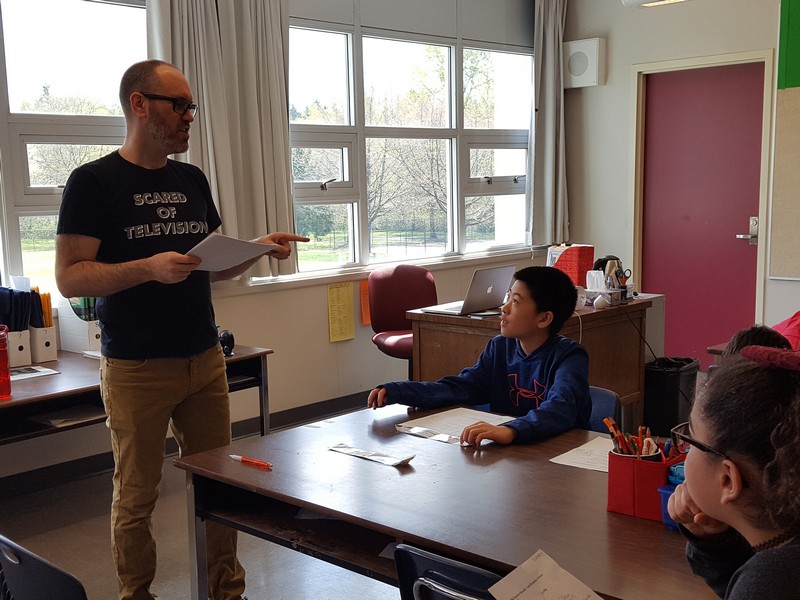Captain Cook Elementary: Globally Aware – Future Change Agents
Arts Education, Health and Career Education, Language Arts, Social Studies
School: Captain Cook Elementary School
Teacher: David Proctor
Artist Collaborators: Gordon Cobb
Class: Grade 7
Overview
Students visited Vancouver Biennale art installations via virtual tour and use them as catalyst to think about local and global issues. They considered the questions, “How do we deal with issues such as housing, food, environmental degradation and poverty?” and, “How do countries manage these issues?”
The students narrowed their inquiry to examine topics relating to the environment. They considered the effects of deforestation, what is being done to protect endangered species, how we can preserve energy, and how we can combat global warming. The students considered these questions on both a local and global level. Furthermore, advances in technology are opening information and collaboration on a massive scale. The students gained an understanding of the power of technology and how it is being used to spark positive change across the globe. This opened up a discussion on the effect of cow’s creation of methane gas, which is contributing to global warming. After engaging in numerous free-writes, the students created a rap about the beef industry and how it could be made more sustainable.
Connection to the Vancouver Biennale Exhibition
Using the Vancouver Biennale website’s virtual tours, the students looked at Magdalena Abakanowicz’ Walking Figures, Dennis Oppenheim’s Engagement, and Yue Munjin’s A-maze-ing Laughter. The students were asked to consider the following questions about the art: What do you see? What do you think it means? What does it remind you of? How might this reflect your own world?
BIG IDEAS
-
What are human responses to global issues such as environmental degradation, decreasing biodiversity, lack of food, water and housing.
-
What can we learn from other countries to improve our situation? How can global knowledge be shared to help countries?
-
How is the digital space being used to move towards a solution to these issues?
- What innovation is happening and how is it being shared in the global village?
Guiding Questions
-
Who is leading innovation and driving change for their global issues?
- How do the Fine Arts communicate ideas, promote creativity and innovation and allow for self expression?
Cross-Curricular Access
Social Studies, Fine Arts (Music), Language Arts (communicating, reading, writing), and Health and Career Education.
Inquiry Challenges/Learning Process
- After narrowing their scope of interest to global warming and its effects on the environment, the students engaged in numerous free-write activities. The students looked at the waste produced by the cattle industry, as well as the effect of car pollution, and how different innovators, such as Tesla, are working to combat them. Cobb then took lines from their free writes and assembled them into a rap about the effects of unsustainable agriculture on the environment.
- The students also listened to bass whoops, beat loops, and solo loops to understand how a “backtrack” is created in music. Cobb then created a backtrack that the students would use to record their original rap over. Students volunteered to rap each verse of the song, with groups of students rapping the chorus together. The process was highly collaborative and inclusive, as students had an opportunity to provide some kind of input into the final product.
- Once the rap was recorded, the students were encouraged to create a multimodal response to the music. The students engaged in a “think-tank” activity, where they thought of how they could create visual representations of the rap. The students created an accompanying “video” using iMovie, with student-drawn pictures representing each verse. This encouraged every student to engage with the inquiry process, even if they were not involved in performing the rap.
Student Creation
Verse 1: I like cows but I don’t like steak. Time to eat less beef, time to be awake. What could be so bad about cows on a farm? Time to open up your eyes, raise the alarm!Calves grow up jus tot die in a factory. How ’bout farmers row something that gives back to the Environment – instead of of making gas green I’d rather have air that is clean (you know what I mean?)
Chorus: The earth is getting warmer, each and every year. Greenhouse gases rising in the atmosphere. (There’s) more at stake than eating steak and filling up your tank. Industry is laughing all the way to the bank.
Verse 2: It’s not wrong to diss – the beef industry, Biggest oversight – in human history. Cows eat grass and produce tonnes of methane, Worse than all the cars combined, totally insane.More global warming from the petroleum industry. Time for us to use our minds – think differently. Use electric cars, Tesla’s done it brilliantly. We gotta find a balance, gotta find symmetry.
Chorus: The earth is getting warmer, each and every year. Greenhouse gases rising in the atmosphere. (There’s) more at stake than eating steak and filling up your tank. Industry is laughing all the way to the bank. *** Enjoy the students’ song here.
Reflection
Grade 7 Teacher – David Proctor
As a classroom teacher, working collaboratively with other educators is invaluable. Gordon is a skilled Music Educator. Writing, composing, and recording a rap is greatly appreciated by students, but it requires some expertise. Teaching the students about Art and how to observe it and to notice and appreciate is worthwhile. In retrospect, I wish we visited the installations as that would have made for better observation. Overall my students were energized, engaged and inspired by the process and working across the curriculum deepens learning.
Artist – Gordon Cobb
Working with David and his students was a wonderful experience. Using the Biennale exhibit Walking Figures as a departure point, we discussed the role of public art and how to look past the surface to find the real meaning behind the imagery. This led to a stimulating conversation about issues of importance to the students, which is how we decided to create a song about global warming. We specifically chose to explore the cattle industry and its impact on the environment, which led to some incredible free writes and discussions. Using the student’s written materials, I created the lyrics for their hip-hop song. I created a backing track in GarageBand using sounds and loops that we chose together. I then added a practice vocal track using my own vocals, which allowed the students to practice the song together in class and at home. We recorded all of the vocals in our second-to-last class together and then I emailed the song to David a few days later. In our final class, we talked about how the students might generate drawings based on the lyrics of the song. We developed storyboard ideas on the white board for each line or section of the song, and the students then generated drawings based on these ideas. Overall I really enjoyed working with David and his students. I think we all learned a lot about the cattle industry and its impact on our environment! I hope to have the opportunity to work with these students again.
Credits
Learning case prepared by Varsha Sharma, UBC 2017 Teacher Candidate in collaboration with David Proctor and Gordon Cobbs


